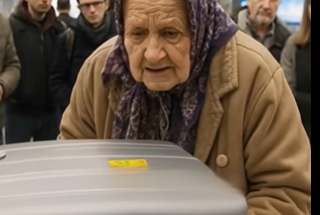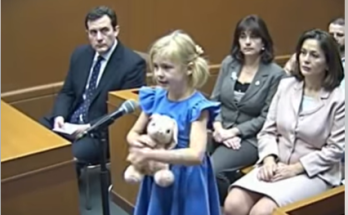“I could make my famous turkey this year,” I said, settling deeper into Michael’s leather couch. “The one with the sage stuffing your mother used to love. Remember how she’d always say it was better than her grandmother’s?”
The words hung in the warm air between us, mixing with the scent of Isabella’s expensive vanilla candles. Michael shifted beside me, his wedding ring catching the light from their 12-foot Christmas tree. Something in his posture changed, shoulders pulling inward as if bracing for impact.
“Dad…” He hesitated, unable to meet my eyes. His gaze was fixed on the marble coffee table. “Unfortunately, you won’t be welcome here for Christmas.”
The words hit me like a physical blow. I blinked, certain I’d misheard. “What do you mean? Why wouldn’t I be welcome?”
“Isabella’s parents are coming,” he said, his voice shrinking with each word. “And they… they’d prefer if you weren’t here.”
My hands went cold. “They’d prefer?”
“It’s just… Dad, please don’t make this harder than it has to be.”
I looked around the living room. I looked at the silk curtains I had paid for when Isabella complained about privacy. I looked at the hardwood floors that had come from my second mortgage. I looked at every inch of this house, a house that bore my fingerprints, my sacrifice, my love for my son.
“Where will I spend Christmas, then?”
Michael’s face crumpled. “Maybe… I don’t know, maybe visit Aunt Rosa? Or we could do something the weekend after.”
The weekend after. As if Christmas was just another appointment that could be rescheduled.
I stood up. “I see.”
“Dad, wait…”
But I was already moving toward the door. My hand found the doorknob, solid and cold. “Son,” I said, without turning around. “Tell Isabella’s parents, ‘Feliz Navidad’.”
The December air hit my face like a slap. I sat in my truck, engine off, staring at the house I’d bought but would never belong in. My phone buzzed. Michael, no doubt, wantedI drove into the darkness.
The truck’s heater hummed against the cold. Every street corner in South Hills held memories of the man I used to be—the one who believed family meant everything. That man was a fool.
The numbers started rolling through my head. $2,800. Every month. For five years. That was $168,000.
It was Maria’s life insurance money. My late wife’s legacy. It was our retirement savings. All of it gone, poured into a house where I wasn’t welcome for Christmas dinner.
When I’d refinanced our house—Maria’s and mine—to cover their down payment, the loan officer had looked at me with pity. “Mr. Flores, are you sure about this? You’re putting a lot at risk.”
I had risked everything. And I had lost.
I had just walked into my own cold kitchen when my phone rang. Isabella. Perfect timing.
“Dennis.” Her voice dripped with the false sweetness she always used. “I heard about the little misunderstanding with Michael.”
“Misunderstanding?” I leaned against my counter. “I don’t think there was any misunderstanding. You made your position quite clear.”
“Look,” she sighed, the sweetness vanishing. “My parents are very traditional. They expect a certain atmosphere during the holidays.”
“A certain atmosphere,” I repeated. “And what atmosphere is that?”
I heard shopping bags rustling. No doubt spending money that should have gone to their mortgage.
“Well,” she said, “they’re not used to your kind of cooking. All that spicy Mexican food… and the loud music. And frankly, Dennis, they are educated people. They expect conversations about current events, literature, art.”
Eight years of biting my tongue. Eight years of swallowing insults for Michael’s sake. “My kind of cooking? You mean the food you ate every Sunday for three years when you were broke? The tamales you said reminded you of your grandmother?”
“That was different,” she snapped. “But now, with my parents here… we can’t have a Mexican peasant embarrassing us.”
“A Mexican peasant.”
“Don’t be dramatic, Dennis. This isn’t about race. It’s about class. My father graduated Summa Cum Laude. My mother speaks four languages. They summer in the Hamptons. What exactly would you contribute to the conversation? Stories about laying tile?”
Rage flooded my chest. “I built a business from nothing. I’ve paid more in taxes than your father made in his best year.”
“Money isn’t everything, Dennis. Breeding matters. And frankly, Maria…” She paused, then delivered the final blow. “Maria understood her place better than you understand yours.”
The room went silent. She had crossed the line. The one I didn’t even know existed.
“What did you say about my wife?” My voice was deathly quiet.
“I’m just saying she knew how to blend in. She didn’t make waves. She understood that some spaces weren’t meant for her.”
My hand tightened around the phone. “Maria had more class in her little finger than your entire bloodline will ever possess.”
“Oh, please. She was a house cleaner who got lucky. At least she had the good sense to stay quiet about it.”
“Isabella.” My voice dropped to a level I didn’t recognize. “I want you to listen very carefully. This conversation is over. We’re done. The family game is over.”
“You can’t just—”
“We’re done,” I repeated, and ended the call.
I set the phone down. I walked to my desk and pulled out the manila folder I’d been avoiding for months. Five years of bank statements. Five years of automatic transfers that had bled me dry.
It was time to stop the bleeding.
I called my bank. “Customer service, this is Jennifer.”
“I need to cancel an automatic transfer.”
“Certainly, sir. I see the transfer you’re referring to. $2,800 monthly to Wells Fargo. You want to cancel it… effective immediately?”
I looked around my kitchen, at the outdated appliances I couldn’t afford to replace. “Effective immediately.”
“Done. The transfer has been cancelled. Anything else?”
“No,” I said, surprised at how good the word felt. “No. That’s everything.”
I hung up. For the first time in five years, next month’s budget would balance. I gathered the bank statements, the mortgage papers, and walked to my fireplace. I struck a match and watched five years of martyrdom turn to ash.
The fire felt warm on my face. I poured myself a glass of the good whiskey I’d been saving.
I raised my glass to Maria’s photo. “Merry Christmas,” I said. “To me.”
The next morning, my phone rang. Isabella.
“Dennis,” she said, her voice sharp with impatience. “I need you to pick up my parents from Spokane airport. Their flight arrives at 2 PM.”
I set my coffee mug down. “Isabella, did you forget our conversation yesterday?”
“Look, whatever that was about, we need to focus on practical matters. My parents need transportation. And let’s be honest, you’re too weak to be my rival. So just get in your truck and pick them up.”
The final insult. “What airline?” I asked, my voice deceptively quiet.
“Alaska, flight 447. Carousel 3. And Dennis,” she added, “wear something decent. Don’t embarrass us.”
She hung up.
I looked at the clock. 10:52 AM. Plenty of time. I poured another cup of coffee and opened the newspaper.
At 2:15 PM, I was settling into my favorite armchair with a fresh cup of tea.
At 2:47 PM, the phone buzzed. Isabella. I let it ring.
By 3:30 PM, it had buzzed six times.
At 3:45 PM, an unknown number called. Her parents, no doubt. I let it ring.
At 4:15 PM, my phone began buzzing incessantly. Isabella. The unknown number. Isabella again. I unplugged my landline and turned my cell phone completely off.
Perfect silence.
I made myself a grilled cheese sandwich and heated up a can of tomato soup. Somewhere across town, three arrogant people were stranded at an airport, wondering how their personal servant had dared to abandon them.
By 5:00 PM, I heard pounding. Not knocking. Pounding, violent and furious, rattling the door frame.
I walked slowly to the door.
“What the hell is wrong with you?” Cody Jenkins shouted, pushing past me into my living room the moment I opened it.
“This is completely unacceptable!” Catherine, his wife, shrieked, following him.
“You humiliated us!” Isabella brought up the rear. “My parents had to take a $60 taxi!”
“Get out of my house.” My voice cut through their rage like a blade.
They froze, stunned by the steel in my tone.
“Excuse me?” Cody’s face turned purple. “You don’t get to make demands.”
“This is my house,” I repeated. “And I want you out. Now.”
Catherine stepped forward. “Dennis, you clearly don’t understand. My husband has connections all over this city. You can’t treat people like us this way and expect—”
“This was a lesson for you,” I interrupted. “A lesson about your excessive arrogance.”
“A lesson?” Isabella gasped. “Who do you think you are—”
“I’m the man who finally stopped being your personal bank account and taxi service,” I said, holding the door open. “The lesson is over. You can leave.”
Cody jabbed a finger toward my chest. “You have no idea who you’re messing with, old man. I know important people. I’ll make your life very difficult. That’s a promise.”
“The consequences will be quite public,” Catherine added, her smile like broken glass.
They left. I bolted the door. Public consequences.
I walked back to my living room. For the first time, I felt a twinge of concern. But it was overwhelmed by a much stronger feeling.
Anticipation.
Three days later, I saw my own face staring back at me from page three of the Spokane Review.
“SPOKANE BUSINESSMAN ABANDONS ELDERLY COUPLE AT AIRPORT DURING STORM.”
The article painted a fantasy of Cody and Catherine Jenkins, “in their late 50s” (they were 68 and 66), stranded in “frigid temperatures” and “dangerous weather.” (It had been 52°F and sunny). It quoted Cody being concerned for my “erratic behavior” and “mental state.”
They had declared total war.
I smiled. They had made three critical mistakes. First, they underestimated me. Second, they made the fight public, which meant I could make my response public. Third, they had documented their entire hypocritical lifestyle online.
I opened my laptop. I researched Cody Jenkins. Retired bank manager. Country Club. I researched Isabella. Her Facebook was a catalog of my sacrifices. “Our beautiful home” (which I paid for). “Expensive dinners” (which I subsidized).
And then I found it. An event on her Facebook page: “Christmas Eve Dinner! So excited to host 12 of our wonderful friends!”
December 24th. Seven days.
I opened a new document. I wasn’t just a “tile layer,” as Isabella had insulted me. I was a businessman. And I knew how to run numbers.
I compiled a timeline. Five years of bank statements. $47,000 for their down payment. $18,000 for the kitchen remodel. $168,000 in monthly mortgage payments. A total of $237,468.
I made 12 copies. One for each dinner guest.
Christmas Eve. 6:30 PM. Their house was glowing, the driveway full of luxury cars. Through the window, I could see Isabella playing the perfect hostess.
I parked across the street. At 6:45 PM, I walked up to the unlocked front door.
I let myself in. Laughter and conversation drifted from the dining room.
“…but darling, that’s not how we do things in our family,” I heard Catherine say.
I walked into the dining room, briefcase in hand. Twelve faces turned toward me, their expressions freezing in shock.
“Good evening, everyone,” I said calmly. “I hope you don’t mind me joining.”
“Dennis!” Isabella hissed. “This is completely inappropriate. You need to leave. Immediately.”
“Actually,” I said, opening my briefcase, “I think your guests deserve to know who really paid for this dinner. This house. And this lifestyle.”
“He’s having some kind of episode,” Isabella said quickly. “Michael, call someone!”
But I was already moving around the table, placing a packet of documents in front of each guest. “Here are the bank records,” I said conversationally. “Five years of financial support. $168,000 in mortgage payments alone. Plus the down payment, renovations… everything you see.”
The room went silent, broken only by the rustling of paper. I watched their faces change as they absorbed the numbers.
“Isabella,” a woman in pearls said, “why didn’t you tell us any of this?”
“It’s… it’s complicated!”
“It’s not,” I interrupted, pulling out the newspaper article. “Let’s talk about what you did tell the media.”
I placed copies of the article on the table. “Mr. Jenkins here used his connections to plant this story, painting me as unstable for abandoning ‘poor elderly people’ in a ‘storm’.”
“Cody,” a gray-haired man said, “what is this?”
“The weather was 52 degrees and sunny,” I said. “And I was banned from this dinner because I wasn’t ‘good enough’ for their company. Because I’m ‘low class.’ Because, as they put it, my ‘spicy Mexican food’ would embarrass them.”
The silence was deafening. The 12 guests stared at Cody, Catherine, and Isabella with open disgust.
“These people,” I addressed the table, “have taken over $200,000 from me while calling me names behind my back. They manipulated my son against me. And when I finally said no, they tried to destroy my reputation. I wanted you all to know the truth.”
I closed my briefcase. “Enjoy the rest of your dinner. It’s the last one I’ll be paying for.”
As I walked out, I heard the explosion begin behind me—raised voices, accusations, the sound of a perfectly constructed social facade shattering into a million pieces. It was the most beautiful Christmas music I’d ever heard.
The letter arrived in March. NOTICE OF DEFAULT. Three months of missed payments. They had 14 days before foreclosure.
Michael knocked on my door that Thursday. He looked like a broken man.
“Dad,” he said, “we need to talk.”
I let him in. He looked around my newly repaired, freshly painted living room.
“Dad, I am so sorry. About everything. The newspaper… the way they treated you… the things they said about Mom…”
“What did they say about your mother?” I asked.
He couldn’t meet my eyes. “That she… knew her place. That she understood boundaries. I should have defended you. I should have stood up to them years ago.”
“Yes,” I said. “You should have.”
He finally broke. “The house is in foreclosure, Dad. We’re going to lose everything. Isabella… I don’t know what I’ll do.”
“You’ll figure it out,” I said, not unkindly. “The same way I figured out how to spend Christmas alone.”
He started to cry then, quietly. “I lost you, didn’t I? I chose them over you.”
“Michael,” I said, “you didn’t lose me. You gave me away. There’s a difference.”
“Is there any chance… can you forgive me?”
“I forgave you months ago,” I said, and I meant it. “But forgiveness doesn’t mean going back. It doesn’t mean I will resume paying for a lifestyle that came with the condition that I be grateful for scraps of your attention.”
“Then what does it mean?”
I stood and pointed to a new photo on my mantle, next to Maria’s. It was me, with Aunt Rosa’s family at Easter. “It means,” I said, “that if you want a relationship with me, you build it from scratch. It means you show respect. And it means you learn to be a man and pay your own bills.”
He stood up, his shoulders straight for the first time. “You’re right. About all of it.”
After he left, I poured a glass of whiskey and stepped onto my back porch. Spring was coming. I had wasted five years being a doormat. I wasn’t wasting any more.
My phone buzzed. A text from Rosa. Dinner Sunday? The kids want to show you their school projects.
I smiled and typed back. Wouldn’t miss it.
Real family, it turned out, was something you found with people who actually wanted you there. Everything else was just expensive theater. And I was done buying tickets. to smooth things over. I didn’t answer.



